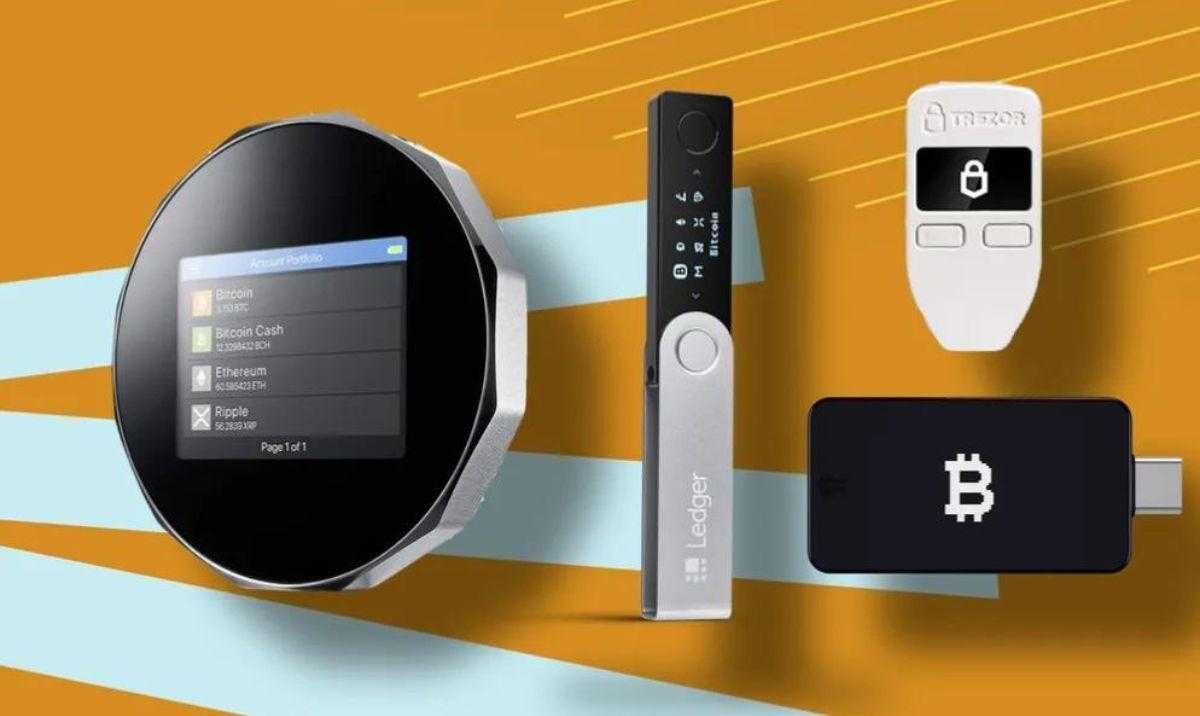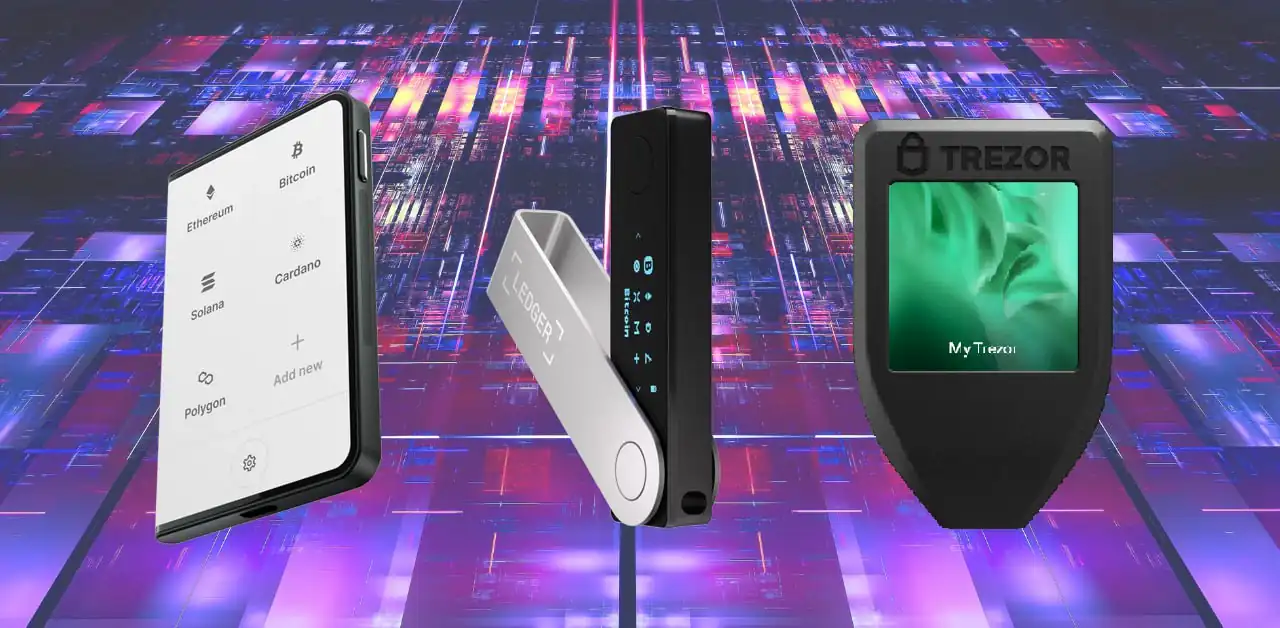Cryptocurrency has undoubtedly gained significant attention over the past decade. Digital currency relies on cryptography for secure transactions and has become a viable investment avenue. As more people begin to invest in cryptocurrencies, the need for secure storage options has become crucial. Enter the world of hardware wallets, providing high-level protection for cryptocurrency investments. Cryptocurrency isn't stored in the traditional sense. Instead, you're storing a private key, critical information that allows you to access your cryptocurrency. This private key is what hardware wallets are designed to protect. In the world of digital currency, security is paramount. There are various types of wallets, including software wallets and online wallets. However, some are more vulnerable to hacks and security breaches. That's where a hardware wallet comes in, promoted as a safer alternative. However, at PlasBit, we believe it is essential to understand the benefits and challenges of such wallets when deciding on the best hardware crypto wallet overall.
What Is a Hardware Wallet?
A hardware wallet is a specialized, tangible electronic gadget engineered explicitly to safeguard cryptocurrency assets. The fundamental concept that underpins the function of hardware wallets involves creating an absolute separation between the user's sensitive private keys and their potentially vulnerable digital devices like computers or smartphones. It is an innovative device that securely houses the user's private keys within a heavily guarded sector of a microcontroller. This arrangement ensures that the private keys cannot be exported from the device in a readable format, thereby offering fortified protection against hacking efforts and malicious software. These hardware wallets are a strong defense against computer viruses that target and steal from software wallets. Unlike paper wallets, which must be eventually imported into a software environment, thus exposing them to potential risks, hardware wallets offer a secure and interactive use. This fact means they can carry out transactions without exposing the private keys. Moreover, hardware wallets can support multiple blockchains concurrently, enabling users to manage cryptocurrencies such as Bitcoin, Ethereum, Altcoins, Lumens, and more, all from a single device. This multi-functionality adds convenience and enhances the security of managing diverse crypto assets. In terms of design, hardware wallets often resemble USB thumb drives, featuring a minimalist design with one or two buttons and occasionally a tiny screen. Their inability to connect directly to the internet adds another layer of security, essentially putting the control of the private keys in the user's hands and making it exceedingly difficult for hackers to access their contents.
How do Hardware Wallets Work?
Understanding the working mechanism of a hardware wallet is essential. Setting up your wallet for the first time will generate a private key, or a master seed, for you. This seed is then used to derive all subsequent private keys sequentially. Connect your hardware wallet to your smartphone or computer when transacting. The transaction is sent to your hardware wallet and signs within the device. Therefore, the private key never leaves the device.
To confirm the transaction, you simply press a button on the device. This feature ensures that even if your computer is compromised, a hacker won't be able to send a payment without physical access to the button on your hardware wallet.

Benefits of Using a Hardware Wallet
We have identified several advantages of using a hardware wallet that we have identified. When choosing the best hardware wallet for your needs, it is recommended to keep these benefits in mind.
Enhanced security:
Enhanced security is the principal benefit of using a hardware wallet for cryptocurrency transactions. Unlike hot wallets constantly connected to the internet, hardware wallets are cold storage, meaning they are offline and more resistant to hacking attempts. Your private keys are stored in a protected area of the device that cannot be transferred out, providing an added layer of protection against online threats.
Multi-blockchain support:
Another significant advantage of hardware wallets is their multi-blockchain support. They can store multiple types of cryptocurrencies, making them highly versatile. Whether you're dealing with Bitcoin, Ethereum, Litecoin, or other cryptocurrencies, you can manage them all from one device. This feature makes hardware wallets a top choice for crypto enthusiasts who deal with various digital currencies.
Wallet-to-wallet trading:
Hardware wallets provide wallet-to-wallet trading capabilities. This facility means you can directly transfer your cryptocurrencies to another hardware wallet without going through an exchange. It saves time and transaction fees, making it a cost-effective way to manage your digital assets.
Recovery features:
Hardware wallets come with robust recovery features. If you lose your device or forget your PIN, you can still retrieve your funds using a unique recovery phrase provided during setup. This phrase is a series of words that can restore cryptocurrency access. It's a critical feature that ensures the safety of your investment.
User control:
User control is another significant benefit of hardware wallets. Hardware wallets give you complete control over your private keys. This feature means you own your cryptocurrencies entirely, reducing the risk of loss due to third-party breaches.
Physical security:
In addition to digital security, hardware wallets offer physical security. They are built with tamper-proof chips similar to passports and credit cards. Even if someone gets hold of your device, they cannot access your funds without your PIN.
Transportability:
Such wallets are compact and portable. You can carry them around like a USB stick and make transactions anywhere. Despite their small size, they offer robust features and functionality, making them a convenient and secure choice for managing cryptocurrencies. Hardware wallets offer many advantages, including enhanced security, multi-blockchain support, wallet-to-wallet trading, robust recovery features, user control, physical security, and transportability. They provide a secure and convenient way to store and manage your digital assets, making them a worthy investment for any cryptocurrency enthusiast.
How to Choose the Best Hardware Wallet
Choosing the best hardware wallet depends on balancing your needs against critical factors such as security features, ease of use, price, and customer support.
Security features:
The primary purpose of a hardware wallet is to provide top-notch security for your digital assets. Therefore, security features should be your most significant consideration. Look for a device that offers robust encryption and two-factor authentication. Additionally, the wallet should provide a recovery option if you lose access to the wallet. Some advanced wallets also offer unique features like a secure chip, similar to the one used in credit cards, to add another layer of security.
Ease of use:
While security is paramount, the usability of the wallet is equally essential. A user-friendly interface allows for smooth navigation and operations. The hardware wallet should be easy to set up and manage without technical expertise. Clear instructions for backup and recovery, simple transaction processes, and easy-to-understand security settings make a wallet more user-friendly. Some wallets also offer compatibility with multiple cryptocurrencies, making them more convenient.
Price:
Hardware wallets come in a range of prices, from affordable to high-end. It's up to you to decide how much you're willing to invest in the security of your digital assets. The features and brand reputation will influence the cost. Remember that while an expensive wallet may offer advanced features, it doesn't necessarily mean it's your best hardware wallet choice. Wallets with more straightforward features may be more suitable for beginners, while those with more advanced options are better for seasoned users.
Customer support:
Research the quality of customer support offered by the wallet provider. A reliable support team can be invaluable, especially if you encounter any problems or have queries about the wallet's functionalities. Check if the provider offers round-the-clock support, the response time, and the support team communicates effectively. Reading ratings and reviews from other users can give you a good idea of the quality of customer support. Remember, the primary goal of buying the best hardware wallet is to protect your digital assets. By prioritizing security features, assessing the ease of use, considering the price, and evaluating customer support, you can choose the best hardware wallet that suits your needs and preferences. It's all about finding the right balance between security and convenience without compromising. Take your time, do your research, and choose wisely.
Comparison of the Best Hardware Wallets
With the global market for crypto hardware wallets expected to reach a staggering USD 877.69 million by 2026, it's clear that secure storage for cryptocurrencies is a growing necessity. Let's compare leading crypto hardware wallets: Ledger Nano X, Trezor, NGRAVE, and the Ellipal Titan.
Ledger Nano X:
The Ledger Nano X is a top-tier crypto hardware wallet praised for its sleek design and versatility. The wallet supports over 1,500 cryptocurrencies, making it one of the most diverse crypto wallets. Its security is bolstered by a custom operating system, BOLOS, designed to resist attacks and secure your private keys.
Trezor wallet:
Trezor wallets are renowned for their robust security measures. They use advanced cryptographic techniques to secure your digital assets, ensuring that your private keys are safe even if your PC is compromised. Trezor wallets also feature a user-friendly interface, making it easy for anyone to store their cryptocurrencies securely.
NGRAVE:
The NGRAVE crypto hardware wallet stands out for its air-gapped solid security features and custom operating systems designed to prevent vulnerabilities. An air-gapped device is completely isolated from other networks, ensuring your private keys are never exposed to the internet. This high-level security feature makes NGRAVE one of the safest crypto wallets on the market.
Ellipal Titan:
The Ellipal Titan is a heavyweight in the realm of crypto hardware wallets. Like the NGRAVE, the Ellipal Titan offers air-gapped security features. Furthermore, it has a physical tamper-resistant design, which means that any attempt to break open the device will automatically delete all stored data. This feature ensures that your digital assets remain secure even in the face of physical threats.
While these wallets offer robust security measures to protect your digital assets, your choice will depend on your specific needs and preferences. The NGRAVE and the Ellipal Titan stand out for their air-gapped security, while the Trezor wallet combines security with user-friendliness. Meanwhile, the Ledger Nano X offers a broad range of supported cryptocurrencies, making it a versatile choice. Remember that a secure hardware wallet provides high-level protection for your digital assets regardless of your choice. Choose wisely and invest in peace of mind.
How To Set Up a Hardware Wallet
Setting it up is straightforward once you have decided on the best hardware wallet.
1. Choose a PIN:
First, you need to connect your wallet to your computer or smartphone. Then, you'll be asked to choose a PIN. This PIN will be required every time you want to access your wallet.
2. Generate a recovery phrase:
Next, your wallet will generate a recovery phrase. This phrase should be written down and stored in a safe place. This recovery phrase can restore your funds if you lose your wallet or forget your PIN.
3. Transfer Crypto:
Finally, you can start transferring cryptocurrency to your new hardware wallet. Ensure to send a small amount first to verify that everything works correctly.
Safety Tips for Using a Hardware Wallet
Hardware wallets, known for their high security, are an excellent option for storing digital assets confidently. However, even with the best hardware wallet for security, it's crucial to take additional safety precautions. Here are the primary considerations that we have identified at PlasBit.
Buy from a trusted source:
Always ensure that you are buying your hardware wallet from a trusted source. Numerous unscrupulous vendors are selling counterfeit wallets to unsuspecting buyers. These devices can be compromised, leading to the loss of your digital assets. Reputable manufacturers sell their products directly or through authorized resellers. Always buy new, and never from auction sites or second-hand sellers.
Never share your PIN or recovery phrase:
Never share your PIN or recovery phrase with anyone. These are the keys to your digital kingdom; if they fall into the wrong hands, your assets could be stolen. Your PIN unlocks your wallet, while your recovery phrase enables you to restore it on a new device if lost or damaged. Treat this information like your most precious possession. Please write it down, store it securely, and never share it digitally.
Keep wallet's firmware updated:
Keeping your wallet's firmware updated is another critical safety measure. Firmware updates often contain security enhancements and fixes for vulnerabilities. Failing to update could leave your wallet open to attacks. Most hardware wallet manufacturers release firmware updates regularly. Ensure you follow official communication channels like their website, email newsletters, or social media pages for updates.
Double-check transaction addresses:
Always double-check transaction addresses before confirming transactions. Cryptocurrency transactions are irreversible, so that any mistake can lead to permanent loss. Cybercriminals often use malware to change copied addresses, tricking you into sending funds to their wallets. Before you confirm a transaction, cross-verify the address on your hardware wallet's screen and the one on your computer. If they don't match, do not proceed with the transaction.
PlasBit Wallet: An Alternative to Using a Hardware Wallet
Our software wallet is an excellent alternative to a hardware wallet, offering high safety and security for crypto users. The foremost element is that all user funds are securely kept in cold storage. This feature means that the users' cryptocurrencies are stored offline, providing enhanced defense against potential cyber threats and hacks. Regarding the protection of private keys, our wallet leverages Secure Enclave technology. This technology safeguards the private keys by securely storing them within a hardware-isolated section of the processor, separate from the primary operating system. This system provides an additional layer of protection, making it incredibly difficult for unauthorized users to access these keys. Our PlasBit wallet also incorporates biometric and two-factor authentication mechanisms for securing the user's account. Biometric authentication uses the unique biological traits of the user to verify an individual's identity. On the other hand, two-factor authentication requires the user to provide two separate forms of identification before gaining access to their account. This combination ensures a robust security framework, making our wallet a safe alternative to traditional hardware wallets. Our platform enables you to access additional financial services such as wire transfers and our crypto debit card.
Protecting Your Crypto with the Best Hardware Wallet
A hardware wallet provides a high level of protection for your cryptocurrency investments. Keeping your private keys offline offers robust security against online threats. Features like PIN protection and recovery phrases ensure that only you can access your digital assets. Whether you're a seasoned cryptocurrency investor or a beginner, investing in a hardware wallet is smart. It's not just about keeping your digital assets safe; it's about knowing your investments are protected. Remember, in the world of digital currency, security is paramount. And a hardware wallet provides just that - a secure, user-friendly, and reliable solution for storing your cryptocurrency.







